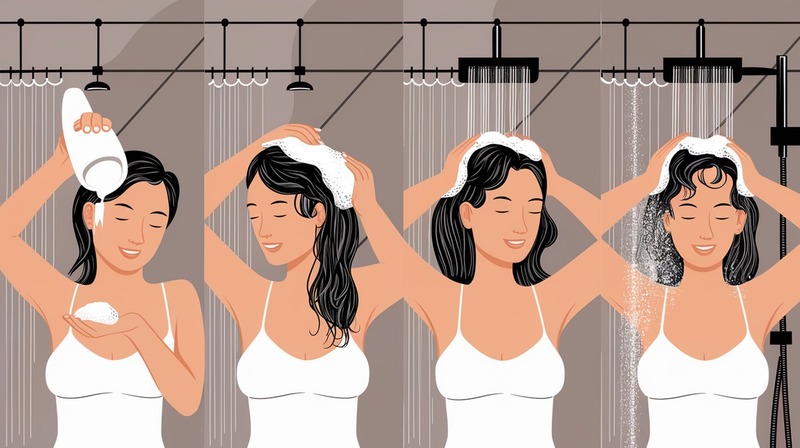Have you ever stood in front of the mirror and asked yourself why your hair became flatter or looks less voluminous than before? The problem of thin hair affects millions of people, so it needs proper treatment and care.
Selecting the right shampoo for thin hair can significantly change your hair from drab to fab. we will guide you through the world of hair shampoos to get the right one for your thin hair type. Soon, you can forget about lifeless hair and welcome volume and shine!
This tutorial will explain what to look for in a Shampoos for Thinning Hair, the benefits of using the proper ingredients, and even some DIY formulations you may try at home.
What is Thin Hair?
Thin hair refers to the density or amount of hair on the scalp, not the individual hair strand thickness. The key characteristics of thin hair are:
- Less number of hair follicles in the scalp, which means there are fewer hair strands per square inch.
- The scalp may become more apparent, especially when the hair is tied or styled in certain ways.
- There is an absence of overall fullness and volume even though the hair strands could be fine or coarse.
- More prone to breakage and fragility as it has fewer hairs.
It’s important to note that thin hair is not the same as fine hair. Thin hair refers to the amount of hair on the head, while fine hair pertains to the size or thickness of each hair shaft. This means that your hair can be fine but thick, or coarse but sparse. Understanding this versatility can inspire a positive and hopeful outlook on caring for your thin hair.
Thin hair requires a unique care regimen. This includes avoiding excessive shampooing, using volumizing products, and handling the hair with care to prevent further hair loss or breakage. Seeking advice from a hair care specialist can also provide valuable insights into treating thin hair, empowering you to make informed decisions about your hair care routine.
Why does thin hair require different treatments?
Special attention should be paid to thin hair since it is usually more delicate and vulnerable than thicker hair. But this comes with its demerit, which includes breakage of hair, split ends and low volume due to the finer hair texture. Thirdly, thin hair is prone to oil buildup and does not need heavy conditioning or washing too frequently.
To this end, properly selecting shampoos and products meant for thinner hair can enhance hair strength, volume, and overall health to reduce damage and enhance hair thickness.
Tips for Choosing the Right Shampoo for Thin Hair

Here are the key things to look for in a shampoo for thin hair:
If you search for these aspects in a shampoo for thin hair, you may discover a product that will provide a delicate cleaning and nourishment and improve the condition of thinning hair.
How to Choose the Best Shampoo for Thin Hair
Choosing the best shampoo for thin hair involves several vital steps to ensure you select a product that effectively addresses your specific hair needs:
- Understand Your Hair Type: Figure out whether your hair is of the oily type or the dry type or if it is of both the oily and dry type. This helps you choose a shampoo that meets your scalp’s oil production requirements without compulsively removing it.
- Look for Sulfate-Free Formulas: Shampoos that do not contain sulfate should be used because they do not make hair dry and are kind to your hair, especially to thin hair types.
- Consider Nourishing Ingredients: This ranges from shampoos that contain elements such as biotin, keratin, and other proteins that can provide the needed volume for the fine hair type. Argan oil and other nourishing oils are also recommended for the fortification of hair and to give it the much-needed moisture that it needs.
- Check for Stimulating Ingredients: Caffeine, biotin, and keratin are some of the compounds that work on the hair root to increase hair growth for people with thin hair.
- Evaluate the Product’s Claims: Often, look at the reviews and product descriptions for more details regarding the benefits of certain shampooing. When choosing shampoos for thinning hair, focus on those claiming to enhance volume, promote new hair growth, and boost the density of the strands.
- Consistency is Key: When using this kind of shampoo repeatedly, your hair gets used to the product and will be able to showcase how it has been transformed. Moving from one product to another may allow the hair to absorb it only partially.
- Tailor to Your Specific Needs: Pay attention to the nature of your hair problem, whether it entails dandruff, itchiness, or dryness and use a shampoo that solves it. For instance, a shampoo containing rosemary oil can be used on the scalp to relieve itchy skin.
- Check the Price and Quality: Published comparisons of various shampoadealing with its prices and quality. However, some hair shampoos cost more than other brands but are better quality and effective. To choose the right products, try to find products with high-quality ingredients and good feedback from other customers.
In this way, you may choose the shampoo for thin hair best suited to help you address the needs of thin hair and achieve better hair health and density results.
How to Use Shampoo for Thin Hair

When to wash your thinning hair depends on several factors; shampoo quality for thin hair:
Here are some tips for using shampoo effectively for thin hair:
- Choose sulfate-free shampoos and search for products containing biotin, keratin, and proteins, making thin hair look and feel voluminous.
- also advised against using thick, creamy shampoo when it is detrimental to fine hair.
- Soak hair with water to ensure that it is sufficiently wet before applying shampoo
- To clean the oil and accumulated substances from the scalp’s surface, apply rotations massaging with shampoo.
- If your hair is extra oily, you can shampoo twice, but this will result in less load.
- Rinse shampoo out fully
- The next step is to wash the hair with a conditioner, but this should be done only on the lengths and tips of the hair, not the roots.
- It is advisable to use a small quantity of conditioner since excessive use may grease the hair and make it harder to manage.
- Rinse it off immediately after application or let it stay for 1-3 minutes, depending on one’s hair type.
- Blow dry the hair and gently wipe it with a smooth cotton T-shirt or microfiber towel instead of squeezing it with regular towels.
- Minimize the use of styling tools at high temperatures that can harm thin and brittle hair.
- Replace creams, pomades, and other wet territory products using volumising mousses and sprays.
- Always ensure to use a heat protector before blow drying or applying any hot devices on your hair.
Shampooing is a critical practice that should be done regularly when one experiences thinning hair conditions. To see changes in hair density and volume, it is recommended to use one type of shampoo for managing hair and avoid changes as hair needs time to adjust.
Advantages of Using Shampoo for Thin Hair

Using shampoo specifically designed for thin hair offers several benefits:
The best product and shampoo for thin hair will make the hair healthier, thicker, and more positioned to grow without breaking when used to treat thinning hair issues.
Top Recommended Shampoos for Thin Hair in 2024
Here are the top recommended shampoos for thin hair in 2024:
- Best Overall
Nécessaire Rosemary Shampoo for Thinning Hair
- Contains rosemary oil, ceramides, proteins, and peptides to nourish and strengthen thin hair
- Helps stimulate the scalp to promote healthy hair growth
- Sulfate-free and gentle cleansing formula
- Best Budget-Friendly
Miellemary Mint Streing Shampoo
- Formulated with biotin to strengthen strands and reduce hair fall
- Smooths, silkifies and adds shine to hair
- Affordable price point without sacrificing quality
- Best Strengthening
- Rice water-infused formula enhances thickness and overall hair health
- Blend of hyaluronic acid, gluco peptide and ceramides deeply cleanse and strengthen
- Leaves hair soft, silky and minimizes breakage
- Best for Shine
- Elevates hair’s texture and shine
- Improves overall appearance of thin, thinning hair
Other top picks include:
- Briogeo Destined for Density Peptide Shampoo
- Paul Mitchell Tea Tree Scalp Care Regeniplex Shampoo
- Pura D’or Professional Grade Biotin Anti-Hair Thinning Shampoo
When choosing a shampoo for thin hair, look for sulfate-free formulas with nourishing ingredients like biotin, keratin, proteins, and stimulating actives like caffeine, and rosemary oil and Tea Tree Shampoo for Dandruff &Soothe Itches Consistency is key, so use the same shampoo regularly to see optimal results in improving hair density and thickness.
DIY Shampoo for Thin Hair
Do you feel like going natural? Here are some simple DIY shampoo for thin hair you can whip up at home:
| Ingredient | Benefits |
|---|---|
| Castile Soap | Gentle, sulfate-free cleansing base |
| Rosemary Essential Oil | Stimulates scalp and promotes hair growth |
| Peppermint Essential Oil | Improves circulation and adds volume |
| Coconut Oil | Nourishes and strengthens strands |
- Instructions
In a clean bottle or container, combine:
- 1 cup of castile soap
- 10 drops of rosemary essential oil
- 5 drops of peppermint essential oil
- 2 tablespoons of coconut oil
- Secure the lid and shake the mixture well until thoroughly combined.
- To use, wet your hair thoroughly with water.
- Apply a small amount of the DIY shampoo to your scalp and gently massage it.
- Rinse the shampoo out thoroughly with warm water.
- Follow up with a lightweight conditioner, focusing on the ends of your hair.
- Use gentle techniques and products to reinforce the conditioner and style as usual.
This simple, natural shampoo for thin hair recipe combines the benefits of castile soap for gentle cleansing, rosemary and peppermint essential oils for stimulating the scalp and adding volume, and coconut oil for nourishing and strengthening thin hair strands. For best results, use it 2-3 times per week.
Conclusion
The right shampoo for thin hair is essential for people with acceptable, thin hair types. Choose sulfate-free shampoos and conditioners that promote volume and contain biotin, keratin, and proteins. Substances like caffeine and rosemary oil are known to stimulate actives that enhance growth.
Do not use heavy creams that tend to make hair oily and heavy. Lightly rub, wash through hair, and apply conditioner only to the tips. Keep using the same product for 4-8 weeks to see positive changes in volume and thickness. Thin hair needs can also be met with DIY shampoos containing rosemary, peppermint, coconut oils, aloe, and honey.
FAQs
Which ingredients should I avoid in a shampoo for thin hair?
Search for products that contain biotin, keratin, proteins, and other stimulating substances like caffeine and rosemary. Do not use rich and creamy products, as they weigh down fine hair.
How often should I use a shampoo for thin hair?
The shampoo should only be used twice to thrice a week. It is important not to wash hair too often as this removes natural oils that are important for hair and skin health.
Is it possible to use a normal shampoo for thin hair?
This is because normal shampoos may not contain the volumizing and strengthening properties required for thin hair. These mild, thickening products are more helpful for the fine and thinning hair type.
Will a shampoo for thin hair help in hair regrowth?
Indeed, shampoo for thin hair cannot make hair grow, though they can help create the illusion of fuller heads of hair by adding oomph to the strands. If the problem is hair loss or regrowth, some additional treatments are needed, such as using minoxidil or contacting the dermatologist.
How soon can one expect to start noticing change when using shampoo for thin hair?
Usually, the recommended period before seeing significant changes in hair volume and thickness is 4-8 weeks of usage. Stay with the same shampoo, and do not switch often, as this will give your hair time to adjust.
Is it possible to use shampoo for thin hair if my hair is coloured?
Yes, many shampoos for thin hair are also suitable for use on colour-treated hair. Stay away from products containing sulfate, as they tend to fade hair color. If you have any concerns, discuss them with your stylist.
Is it possible for hair to regrow once they have thinned?
Hair loss can regrow based on the reason behind the hair loss issue. Those who lose hair because of the lack of nutrients, stress, pregnancy, and all those other non-hereditary causes could regrow their hair. If one is experiencing new hair loss or hair thinning, the best thing to do is consult the doctor.

